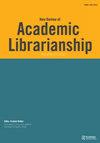Librarian, Faculty, and Student Perceptions of Academic Librarians: Study Introduction and Literature Review
IF 2.3
Q2 INFORMATION SCIENCE & LIBRARY SCIENCE
引用次数: 17
Abstract
Abstract A survey concerning perceptions of academic librarians was conducted at a large, 4-year university with three populations: librarians, faculty, and undergraduate students. The high response rate and the use of an instrument based on previous studies offers the possibility of longitudinal comparison and the identification of relationships between groups within perceptions of librarians. Subsequent papers will present results from the three surveys and offer analysis across the three groups. The literature review focussed on research studies of perceptions of librarians. Subsequent papers will present results from the three surveys and offer analysis across the three groups. The literature review focussed on research studies of U.S. and Canadian academic libraries since 2000 with relevance to these major research questions: perceptions about what librarians know (expertise and skills), what librarians do (role and duties), and what librarians are like (motivations and affective behaviours). Librarians’ perceptions of themselves as critically important yet underappreciated seem to have persisted, perhaps because they are the only group to see the university-wide scope of their jobs, whereas, non-librarian faculty and students have a more limited views of the profession. In contrast to previous studies, recent literature suggests that course-integrated information literacy (IL) instruction has increased the visibility of librarians as educators to both faculty and students. The influence of popular media on students’ perceptions seems less powerful, opening the door wider for library marketing and branding programmes.图书馆员、教师和学生对学术图书馆员的看法:研究介绍和文献综述
摘要:本研究在一所四年制大学进行了一项关于学术图书馆员观念的调查,调查对象包括图书馆员、教职员工和本科生。高回复率和基于先前研究的工具的使用提供了纵向比较的可能性,并确定了图书馆员观念中群体之间的关系。随后的论文将介绍三个调查的结果,并提供跨三个组的分析。文献综述集中于对图书馆员认知的研究。随后的论文将介绍三个调查的结果,并提供跨三个组的分析。文献综述集中于2000年以来美国和加拿大学术图书馆的研究,与这些主要研究问题相关:对图书馆员所知(专业知识和技能),图书馆员所做(角色和职责)以及图书馆员是什么样的(动机和情感行为)的看法。图书馆员认为自己非常重要,但却没有得到充分的重视,这种看法似乎一直存在,也许是因为他们是唯一一个看到自己工作在全校范围内的群体,而非图书馆员的教职员工和学生对这一职业的看法则更为有限。与之前的研究相反,最近的文献表明,课程整合的信息素养(IL)教学提高了图书馆员作为教师和学生教育者的知名度。大众媒体对学生观念的影响似乎不那么强大,这为图书馆营销和品牌推广项目打开了更大的大门。
本文章由计算机程序翻译,如有差异,请以英文原文为准。
求助全文
约1分钟内获得全文
求助全文
来源期刊

New Review of Academic Librarianship
Social Sciences-Library and Information Sciences
CiteScore
3.40
自引率
0.00%
发文量
20
 求助内容:
求助内容: 应助结果提醒方式:
应助结果提醒方式:


